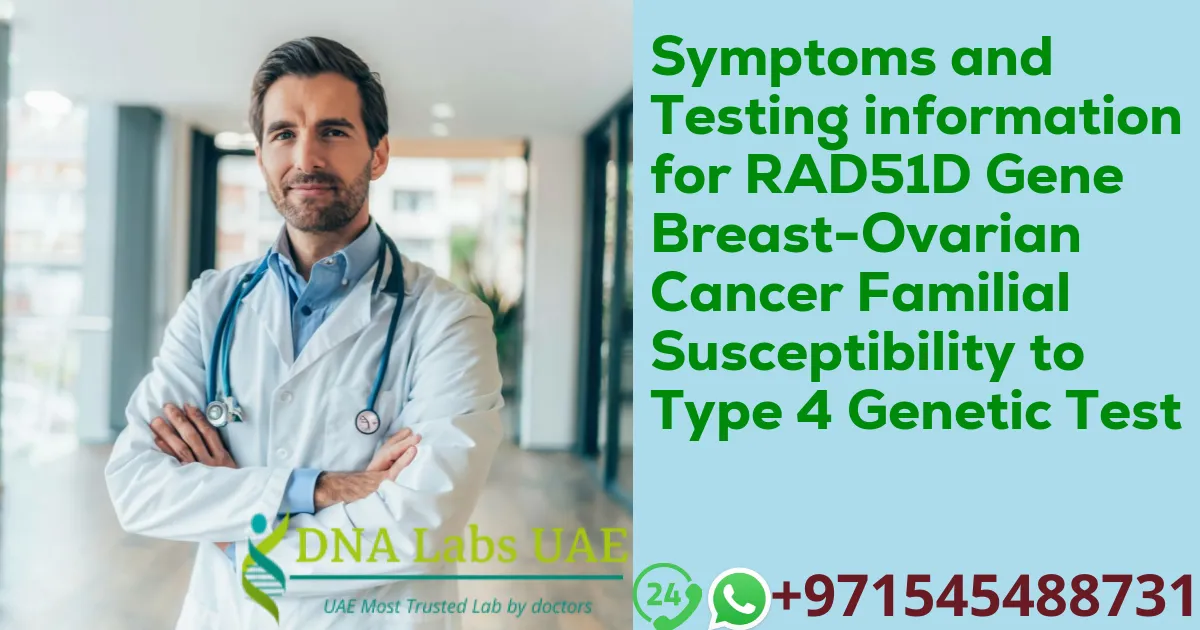In the realm of genetic testing and personalized medicine, understanding one’s genetic predisposition to certain cancers is a significant step toward preventative health care. Among the myriad genetic tests available, the RAD51D gene breast-ovarian cancer familial susceptibility to type 4 genetic test stands out for its importance in assessing the risk of developing breast and ovarian cancers. DNA Labs UAE is at the forefront of providing this crucial testing service, offering insights into the RAD51D gene’s role in cancer susceptibility.
The RAD51D gene is integral to the body’s process of repairing DNA damage, which, if left unchecked, can lead to cancer. Mutations in the RAD51D gene significantly increase an individual’s risk of developing ovarian and breast cancers. Identifying these mutations early on through genetic testing can empower individuals and their healthcare providers to take proactive steps in cancer prevention or early detection.
Symptoms and Risk Factors
It is important to note that carrying a mutation in the RAD51D gene does not guarantee the development of cancer, but it does elevate the risk. The symptoms associated with RAD51D-related breast and ovarian cancers do not differ significantly from those of cancers not linked to this genetic mutation. For breast cancer, symptoms can include a lump in the breast, changes in breast shape or size, skin changes, and nipple discharge. Ovarian cancer symptoms are often vague but can include bloating, pelvic or abdominal pain, and urinary symptoms. Awareness of family history is crucial, as a pattern of breast or ovarian cancer across multiple generations can indicate an inherited gene mutation like that in the RAD51D gene.
Who Should Consider the Test?
- Individuals with a strong family history of breast or ovarian cancer, especially if the cancers occurred at a young age.
- Those who have a relative with a known RAD51D gene mutation.
- People with a personal history of multiple cancers, including breast and ovarian cancer.
Considering these factors, consulting a healthcare provider or a genetic counselor to discuss the need for genetic testing is advisable. They can provide guidance based on personal and family medical history and the potential implications of test results.
Test Procedure and Cost
The RAD51D gene breast-ovarian cancer familial susceptibility to type 4 genetic test involves a simple blood draw or saliva sample. The sample is then analyzed in the lab for the presence of mutations in the RAD51D gene. DNA Labs UAE offers this test for a cost of 4400 AED, a worthwhile investment in personal health and peace of mind. Results are typically available within a few weeks and are discussed in a confidential consultation with a genetic counselor or healthcare provider.
Understanding the test results is crucial. A positive result indicates the presence of a RAD51D gene mutation, suggesting an increased risk of developing breast or ovarian cancer. A negative result means no RAD51D gene mutation was detected, which can provide relief but does not eliminate the risk of cancer. A variant of uncertain significance may also be reported, indicating that the impact of a detected mutation on cancer risk is not yet clear.
Benefits of Genetic Testing
Identifying a RAD51D gene mutation can significantly impact an individual’s approach to cancer prevention. For those with a mutation, increased surveillance, lifestyle changes, and in some cases, preventative surgeries, can be considered to reduce cancer risk. Furthermore, this knowledge can inform family members of their potential risk, allowing them to make informed decisions about their health.
For more information on the RAD51D gene breast-ovarian cancer familial susceptibility to type 4 genetic test, and to schedule a test, visit DNA Labs UAE.
Understanding one’s genetic makeup and associated risks is a powerful tool in the fight against cancer. Through comprehensive testing like the RAD51D gene test, individuals can take proactive steps towards cancer prevention and early detection, ultimately leading to better health outcomes.



